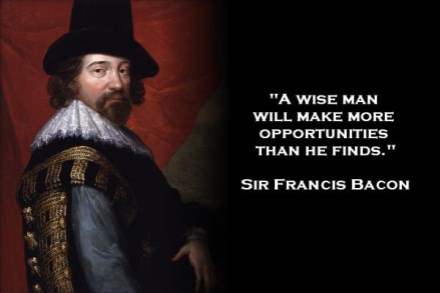What to Do When You Travel, According to Sir Francis Bacon

Sir Francis Bacon, Baron Verulam and Viscount St. Albans (1561 – 1626) was an English philosopher, scientist, and statesman. He was probably best known for his use of the inductive method in his scientific exploits, and for his works Novum Organum (1620) and The Advancement of Learning (1605). However, Sir Francis Bacon also wrote the essay titled "Of Travel," which is a beautiful account of things he learned and found amazing in the art and practice of traveling.
Here was a shorter account of the tips the 17th century philosopher in his lovely essay, and the tips he dispensed, in a short article that you can read even during your short lunch break.
One must make travel a part of his or her life’s education. "Travel, in the younger sort, is a part of education; in the elder, a part of experience. He that travelleth into a country, before he hath some entrance into the language, goeth to school, and not to travel."
On keeping a travel journal, whether embarking on a journey at sea or on land. "It is a strange thing, that in sea voyages, where there is nothing to be seen but sky and sea, men should make diaries; but in land travel, wherein so much is to be observed, for the most part they omit it; as if chance were fitter to be registered than observation: let diaries, therefore, be brought in use."
When traveling, one must always seek interesting sights, such as the following:
- "The courts of princes (especially when they give audience to ambassadors)…"
- "The courts of justice (while they sit and hear causes)…"
- "The churches and monasteries (with the monuments which are therein extant)…"
- "The walls and fortifications of cities and towns…"
- "The havens and harbours, antiquities and ruins…"
- "Treasuries of jewels and robes, cabinets and rarities…"
- "Shipping and navies…"
- "Houses and gardens of state and pleasure, near great cities…"
- and "Armouries, arsenals, magazines, exchanges, burses, warehouses."
When traveling, one must always look for interesting activities, such as the following:
- "Exercises of horsemanship, fencing, training of soldiers, and the like…"
- "Comedies, such whereunto the better sort of persons do resort…"
- "Libraries, colleges, disputations, and lectures…"
- "Triumphs, masks, feasts, weddings, funerals, capital executions, and such shows."
The traveler should make good use of local resources and guidebooks. "Let him carry with him also some card, or book, describing the country where he travelleth, which will be a good key to his inquiry. Let him, upon his removes from one place to another, procure recommendation to some person of quality residing in the place whither he removeth, that he may use is favour in those things he desireth to see or know."
One should explore different experiences, even in just one destination. "Let him not stay long in one city or town, more or less as the place deserveth, but not long. When he stayeth in one city or town, let him change his lodging from one end and part of the town to another, which is a great adamant of acquaintance."









